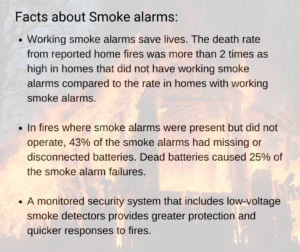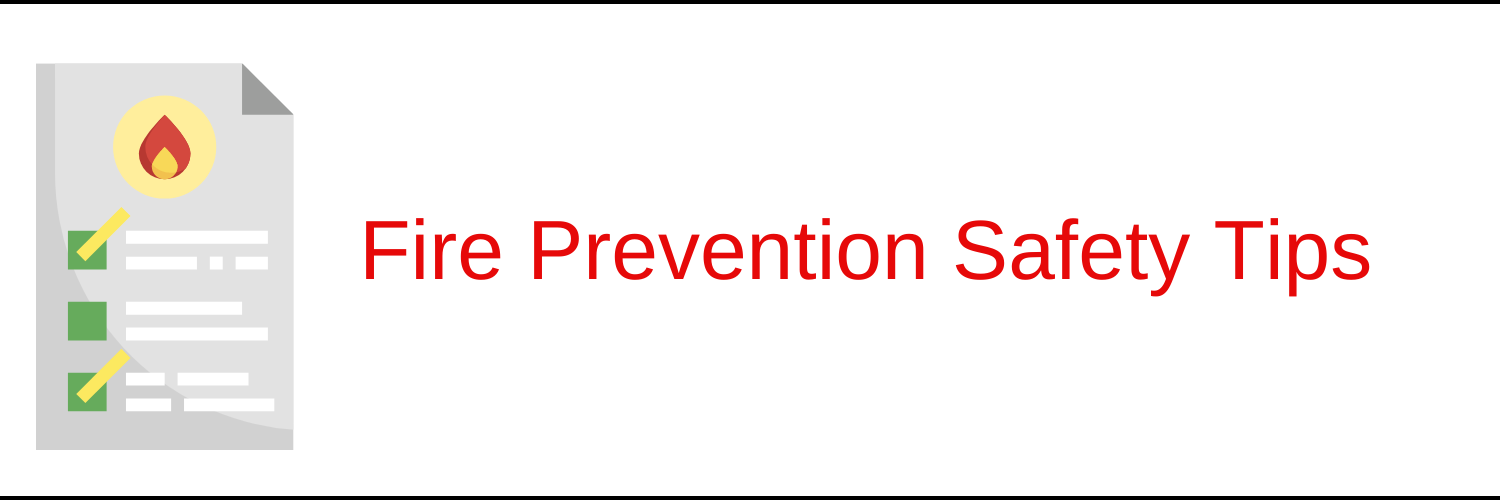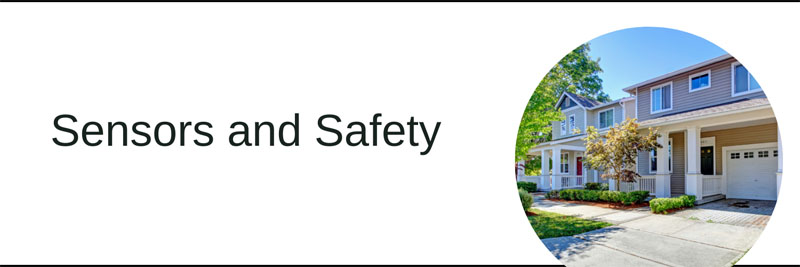October is Fire Prevention Month; fire departments nationwide hold educational events focused on fire and home safety. To support this effort, we’ve compiled four tips to help keep you and your family safe:
1) Smoke Alarms
- Smoke alarms are essential. If you don’t have them, install them or have them installed by a North Carolina-certified electrician.
- Maintain your smoke alarms – to make sure they are working properly, test your smoke alarms at least once a year by pressing the test button to be sure the alarm is working. And don’t let them get too old – consider replacing all smoke alarms in your home every 7-10 years.
- When a smoke alarm sounds, get outside. Then call 911 and stay outside until the fire department says it’s safe to re-enter your home.

- Connecting additional smoke alarm detectors to your security system and monitoring them can add additional peace of mind—when the alarm sounds, the fire department is automatically called and can be dispatched. With a hardwired home security system, auxiliary smoke/heat/CO sensors don’t have batteries that require changing and have a backup battery for when the power is out. Also, many of Secur-Tek’s additional smoke alarms sound at the keypad – so you don’t have another beeping unit on your ceiling. It sounds at the keypad and can be cleared when the smoke/issue has passed.
2) Fire Extinguishers
Fire extinguishers should be available on every level of the home, especially in the kitchen and garage. Store them in accessible places or mount them on the wall for easy access.
Read the instructions carefully and teach all family members how to use it.
When using a fire extinguisher, it helps to remember the PASS technique:
P – Pull the pin
A – Aim directly at the source of the fire
S – Squeeze the lever slowly and smoothly to get the flow even
S – Swipe back and forth to contain and eliminate all burning fuel
3) Prevent household fires
- Kitchen fires caused by unattended cooking are a major cause of fires. Don’t leave items unattended and remember to turn all pot handles inward.
- Ensure your fireplace screen covers the entire fireplace
- Have proper ventilation for heaters and other small appliances
- Use the correct size fuses and check for worn-out electrical wiring
- If you use many Lithium-ion batteries, Install Heat Sensors. Many insurance companies require a monitored heat detector in the garage if an EV charger is installed.
4) Make an Escape Plan:
In the event of a home safety emergency, every second counts. According to the National Fire Protection Association, you may have less than two minutes to escape after your smoke alarms sound. That’s why it’s important to be prepared – plan and practice an escape route with your family:
- Walk through your home and identify at least two ways out of each room. If windows or doors are blocked, clear them so they can be opened
- For two-story houses, consider equipping bedrooms with escape ladders to provide additional exits. This safety feature is best added during construction and Secur-Tek has these in stock.
- Decide who should assist small children or infants out of the home.
- Assign a meeting spot outside that is a safe distance away from your house – like the mailbox, tree, or neighbor’s house
- Ensure your street address is visible for first responders to see
- If you have children, teach them how to call 9-1-1 after arriving at your meeting spot and help them memorize your home address
- Once you have your escape plan, stage a practice fire drill **.
Secur-Tek , Inc. offers customers the best in home security – combining a personal touch with industry knowledge and connections built on 35+ years in the industry. We hand-select name-brand suppliers, like First Alert, the most trusted brand in fire safety*.
Our service area includes Apex, Cary, Fuquay-Varina, Chapel Hill, Clayton, Garner, Holly Springs, Durham, Raleigh, Morrisville, and Pittsboro in North Carolina. Call us at 919-387-1800 or use the form below.
Resources:
For more information on safety and fire prevention go to: https://www.apexnc.org/335/Safety-Information or your local government safety office.
For information on heat alarms, please see https://secur-tek.com/sensors-and-your-security-system/
*First Alert Brand Trust Survey, March 2023 – Results are based on the responses of 1,043 adult homeowners, ages 25 and older, living in the United States who completed an online survey asking them to choose from six brands in the smoke, fire and carbon monoxide protection space.
**We recommend a test of the security system every month. If you would like to incorporate this into your practice, have the system placed on test (make sure it is on test), then hold the Fire panic button, and the siren will sound in your home. Please be mindful of neighbors, dogs, children when you do this.


